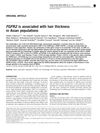 February 2024 in “BMC genomics”
February 2024 in “BMC genomics” The TRPV3 gene variant may cause the long-haired suri alpaca coat.

Different genes cause Female Pattern Hair Loss compared to male hair loss, and treatments vary, but more research is needed to understand it fully.
 October 2022 in “BMC genomics”
October 2022 in “BMC genomics” RNA editing significantly affects hair growth and follicle cycling in the Tianzhu white yak.
September 2022 in “Translational Andrology and Urology” Finasteride may cause lasting sexual and mental health issues, and genetic screening could help prevent them.
1 citations,
September 2023 in “Animals” A new goat gene affects cashmere fiber thickness; certain variations can make the fibers coarser.
 December 2022 in “IntechOpen eBooks”
December 2022 in “IntechOpen eBooks” Forensic DNA Phenotyping accurately predicts physical traits and is used in investigations, but needs more diverse population data for confirmation.
 45 citations,
July 2009 in “Journal of human genetics”
45 citations,
July 2009 in “Journal of human genetics” A gene variation is linked to hair thickness in Asians.
 89 citations,
August 2008 in “Human genetics”
89 citations,
August 2008 in “Human genetics” The EDAR gene greatly affects hair thickness in Asian populations.
 19 citations,
April 2014 in “Hormones”
19 citations,
April 2014 in “Hormones” Hormones and genetics play key roles in male and female baldness, which can affect mental health and may be linked to other health issues.
 9 citations,
March 2020 in “Gene”
9 citations,
March 2020 in “Gene” Certain gene variants in estrogen receptors are linked to polycystic ovary syndrome, mainly affecting metabolism, in Tunisian women.
 January 2023 in “Türkiye klinikleri adli tıp ve adli bilimler dergisi”
January 2023 in “Türkiye klinikleri adli tıp ve adli bilimler dergisi” DNA markers can help predict male pattern baldness, useful in criminal and missing person cases.
32 citations,
September 2013 in “Breast cancer research” A specific gene variant is linked to a higher risk of hair loss from chemotherapy in breast cancer patients.
 2 citations,
May 2023 in “Journal of Advanced Research”
2 citations,
May 2023 in “Journal of Advanced Research” Two mutations in KRT74 and EDAR genes cause sheep to have finer wool.

Cross-section trichometry is an accurate method to measure hair loss and growth.
 February 2013 in “Journal of the American Academy of Dermatology”
February 2013 in “Journal of the American Academy of Dermatology” Certain gene variations may increase the risk of alopecia, and platelet-rich plasma treatment can improve hair density in those with hair loss; a rare case of facial Becker's nevus was linked to uneven beard growth.
 13 citations,
October 2010 in “Pharmacogenomics”
13 citations,
October 2010 in “Pharmacogenomics” Researchers found that most genes affecting drug responses are not fully covered by commercial SNP chips, suggesting the need for more comprehensive tools to optimize drug selection based on genetics.
 July 2024 in “Indian Journal of Dermatology Venereology and Leprology”
July 2024 in “Indian Journal of Dermatology Venereology and Leprology” Certain gene variations in PITX2 are linked to a higher risk of male pattern baldness in Indians.
98 citations,
May 2016 in “Genes” Understanding wool keratin-associated proteins in sheep can help improve wool quality through selective breeding.
 49 citations,
June 2019 in “eLife”
49 citations,
June 2019 in “eLife” Ancient DNA blocks are still present in human genomes, possibly due to advantages they provide.
1 citations,
January 2023 in “Frontiers in genetics” Certain genetic markers linked to wool quality in Rambouillet sheep were identified, which can guide better breeding choices.
Genetic analysis of rabbits identified key genes for traits like coat color, body size, and fertility.
 2 citations,
February 2013 in “Journal of The American Academy of Dermatology”
2 citations,
February 2013 in “Journal of The American Academy of Dermatology” Platelet-rich plasma may improve hair density in androgenetic alopecia patients.
 30 citations,
July 2019 in “Endocrinology”
30 citations,
July 2019 in “Endocrinology” Certain HSD3B1 gene types are linked to worse prostate cancer outcomes and affect treatment response and other health conditions.
 60 citations,
January 2007 in “Human Genetics”
60 citations,
January 2007 in “Human Genetics” AR polyglycine repeat doesn't cause baldness.
 2 citations,
January 2019 in “Medizinische Genetik”
2 citations,
January 2019 in “Medizinische Genetik” The document reports findings on genetic research, including ethical concerns about genome editing, improved diagnosis of mitochondrial mutations, solving inherited eye diseases, confirming gene roles in epilepsy, linking a gene to aneurysms, and identifying genes associated with age-related macular degeneration.
 4 citations,
April 2021 in “Experimental and Molecular Medicine”
4 citations,
April 2021 in “Experimental and Molecular Medicine” The conclusion is that certain genetic factors and blood types may affect COVID-19 severity, but changes in ACE2 and TMPRSS2 genes are not clearly linked to it.
 244 citations,
September 2008 in “Annual Review of Genomics and Human Genetics”
244 citations,
September 2008 in “Annual Review of Genomics and Human Genetics” The document concludes that the fast-growing direct-to-consumer genetic testing market lacks sufficient regulation, posing risks to consumers due to questionable test quality and accuracy.
 157 citations,
May 2021 in “Endocrine Reviews”
157 citations,
May 2021 in “Endocrine Reviews” Early diagnosis and individualized treatment improve outcomes for Congenital Adrenal Hyperplasia.
 147 citations,
November 2020 in “International Journal of Molecular Sciences”
147 citations,
November 2020 in “International Journal of Molecular Sciences” Keratinocytes help heal skin wounds by interacting with immune cells and producing substances that kill pathogens.
 144 citations,
August 2019 in “Cells”
144 citations,
August 2019 in “Cells” The WNT signaling pathway is important in many diseases and targeting it could offer new treatments.
























